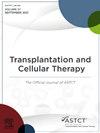T Cell Immune Response to Influenza Vaccination When Administered Prior to and Following Autologous Chimeric Antigen Receptor-Modified T Cell Therapy
IF 3.6
3区 医学
Q2 HEMATOLOGY
引用次数: 0
Abstract
Chimeric antigen receptor-modified T (CAR-T) cell therapies are gaining wider use in relapsed and refractory malignancies. However, data on vaccination in this population is lacking. We evaluated T cell responses in an established cohort of CAR-T recipients and healthy controls before and after 2019 to 2020 influenza vaccination. Peripheral blood mononuclear cells were isolated from healthy controls and patients who received the 2019 to 2020 influenza vaccine pre- or post-CD19, CD20, or B cell maturation antigen CAR-T. T cells were expanded in vitro for 10 days with peptide libraries for hemagglutinin (HA) and nucleoprotein from the 2019 to 2020 vaccine influenza A strains and analyzed by flow cytometry following interferon-γ/tumor necrosis factor-α (IFNγ/TNFα) intracellular staining. Antibody response was evaluated by a hemagglutination inhibition assay. Twenty-nine participants, including eight immunocompetent adults, seven pre-CAR-T, and 14 post-CAR-T patients, were evaluated. IFNγ+/TNFα+ T cell responses after influenza vaccination in healthy controls varied with an increased response to HA-Kansas after vaccination in 7/8 individuals. In the pre-CAR-T cohort, there was a rise in CD4+ T cell response to HA-Brisbane in 6/7 patients after vaccination that remained detectable in 3/4 evaluable patients 90 days post-CAR-T. Five of six patients who lacked an antibody response nonetheless demonstrated a T cell response to HA-Brisbane. There was no association between time since CAR-T administration, baseline immunoglobulin G, or absolute lymphocyte count and change in CD4+ T cell IFNγ+/TNFα+ response pre- to postvaccine for the post-CART cohort. These data demonstrate that cell-mediated immunity to the influenza vaccine can be elicited in patients vaccinated pre-CAR-T and sustained post-CAR-T, filling an important gap from lack of humoral responses.

在自体CAR-T细胞治疗之前和之后接种流感疫苗时T细胞免疫反应。
背景:嵌合抗原受体修饰的T细胞(CAR-T)疗法在复发和难治性恶性肿瘤中的应用越来越广泛。然而,缺乏这一人群的疫苗接种数据。我们评估了2019-2020年流感疫苗接种前后CAR-T受体和健康对照者的T细胞反应。方法:从健康对照组和接受2019-2020流感疫苗前或后cd19、CD20或B细胞成熟抗原(BCMA) CAR-T治疗的患者中分离外周血单个核细胞。用2019-2020年甲型流感疫苗株血凝素(HA)和核蛋白(NP)肽文库体外扩增T细胞10天,并用IFNγ/TNFα细胞内染色流式细胞术分析。通过血凝抑制(HAI)试验评估抗体反应。结果:29名参与者,包括8名免疫正常的成年人,7名car - t前患者和14名car - t后患者,进行了评估。健康人接种流感疫苗后IFNγ+/TNFα+ T细胞应答随接种后HA-Kansas应答的增加而变化。在car -T前队列中,接种疫苗后6/7患者的CD4+ T细胞对HA-Brisbane的反应上升,在car -T后90天的3/4可评估患者中仍可检测到。6名缺乏抗体应答的患者中有5名对HA-Brisbane表现出T细胞应答。CAR-T注射后的时间、基线IgG或绝对淋巴细胞计数与CAR-T接种前后CD4+ T细胞IFNγ+/TNFα+反应的变化之间没有关联。结论:这些数据表明,细胞介导的流感疫苗免疫可以在接种car - t前和持续car - t后的患者中被激发,填补了缺乏体液反应的重要空白。
本文章由计算机程序翻译,如有差异,请以英文原文为准。
求助全文
约1分钟内获得全文
求助全文
来源期刊

Transplantation and Cellular Therapy
Medicine-Hematology
CiteScore
7.00
自引率
15.60%
发文量
1061
审稿时长
51 days
 求助内容:
求助内容: 应助结果提醒方式:
应助结果提醒方式:


